
Congolese music is one of the most influential music forms of the African continent. Since the 1930s, Congolese musicians have had a huge impact on the African musical scene and elsewhere. Many contemporary genres of music, such as Kenyan Benga and Colombian Champeta, have been heavily influenced by Congolese music. In 2021, Congolese rumba joined other living traditions such as Jamaican reggae music and Cuban rumba on UNESCO's "intangible cultural heritage of humanity" list.
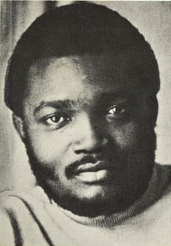
François Luambo Luanzo Makiadi was a Congolese singer, guitarist, songwriter, bandleader, and cultural revolutionary. He was a central figure in 20th-century Congolese and African music, principally as the bandleader for over 30 years of TPOK Jazz, the most popular and influential African band of its time and arguably of all time. He is referred to as Franco Luambo or simply Franco. Known for his mastery of African rumba, he was nicknamed by fans and critics "Sorcerer of the Guitar" and the "Grand Maître of Zairean Music", as well as Franco de Mi Amor by female fandom. AllMusic described him as perhaps the "big man in African music". His extensive musical repertoire was a social commentary on love, interpersonal relationships, marriage, decorum, politics, rivalries, mysticism, and commercialism. In 2023, Rolling Stone ranked him at number 71 on its list of the 250 Greatest Guitarists of All Time.
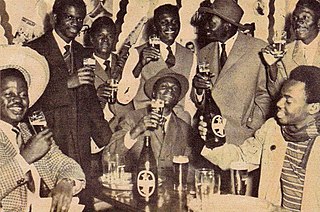
OK Jazz, later renamed TPOK Jazz, was a Congolese rumba band from the Democratic Republic of the Congo established in 1956 and fronted by Franco. The group disbanded in 1993, but reformed in 1996.
Sam Mangwana, is a Congolese-born musician, born to Angolan parents. He was the frontman of his bands Festival des Maquisards and African All Stars. Mangwana was a member of François Luambo Makiadi's seminal band TPOK Jazz, and Tabu Ley Rochereau's bands African Fiesta, African Fiesta National and Afrisa International.
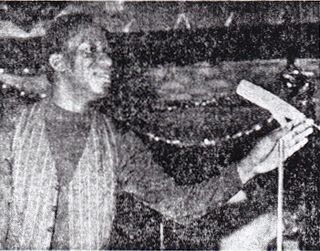
Pascal-Emmanuel Sinamoyi Tabu, better known as Tabu Ley Rochereau, was a leading African rumba singer-songwriter from the Democratic Republic of the Congo. He was the leader of Orchestre Afrisa International, as well as one of Africa's most influential vocalists and prolific songwriters. Along with guitarist Dr Nico Kasanda, Tabu Ley pioneered soukous and internationalised his music by fusing elements of Congolese folk music with Cuban, Caribbean and Latin American rumba. He has been described as "the Congolese personality who, along with Mobutu, marked Africa's 20th century history." He was dubbed "the African Elvis" by the Los Angeles Times. After the fall of the Mobutu regime, Tabu Ley also pursued a political career. His musical career ran parallel to the other great Congolese rhumba bandleader and rival Franco Luambo Makiadi who ran the band TPOK Jazz throughout the 1960s, 1970s and '80s.

Kalamu is a commune in the Funa District of Kinshasa, located in the western region of the Democratic Republic of the Congo. Covering an area of 6.64 square kilometers, Kalamu lies in the central part of the city-province of Kinshasa. It is bordered by the Kinshasa commune to the north, Makala to the south, and Limete to the east, with Avenue de l'Université marking the boundary. As of 2015, Kalamu had an estimated population of 974,669, while a 2020 estimate noted a decrease to 208,155.
Loningisa was a studio and record label based in Kinshasa in the Democratic Republic of the Congo. Loningisa was made famous by the emergence of the African rumba band OK Jazz, whose music became popular, and a big influence on African and Congolese popular music.
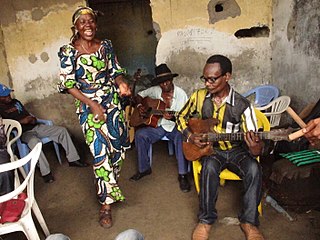
Congolese rumba, also known as African rumba, is a dance music genre originating from the Republic of the Congo and Democratic Republic of the Congo. With its rhythms, melodies, and lyrics, Congolese rumba has gained global recognition and remains an integral part of African music heritage. In December 2021, it was added to the UNESCO list of intangible cultural heritage.
Jean de Dieu Makiese, popularly known as Madilu System, was a Congolese rumba singer and songwriter, born in what was then Léopoldville, Belgian Congo. He was once a member of the seminal band TPOK Jazz which dominated the Congolese scene from 1960s through 1980s.
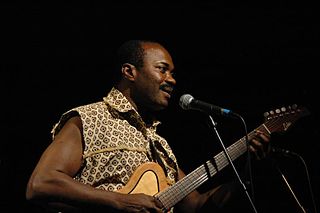
Pépé Felly Manuaku, also known as Pépé Fely is a Congolese rumba guitarist, songwriter, producer, arranger, bandleader and lyricist from the Democratic Republic of the Congo (DRC). He has been described as the foremost Congolese solo guitarist of his generation. He is a founding member of the iconic groups Zaïko Langa Langa, Les Ya Toupas and Grand Zaïko Wawa. His style of guitar is the last style officially credited as a "School" or Genre of guitar following the styles "Fiesta" created by "Le Docteur" Nico Kassanda and "Odemba" created by "Le Sorcier" Franco Luambo Makiadi. He is credited with establishing the guitar as the lead instrument in contemporary Congolese music introducing Synthesiser, Bouzouki, Advanced Guitar effect pedal techniques, new arrangement and recording techniques.
Simaro Massiya Lutumba Ndomanueno, known as Simaro, was a Congolese music rhythm guitarist, songwriter, poet, composer, and bandleader. He was a member of the seminal Congo music band TPOK Jazz, which dominated the music scene in the Democratic Republic of the Congo (DRC) from the 1960s to the 1980s.

Isaac Musekiwa was a Congolese rumba recording artist and saxophonist, in the Democratic Republic of the Congo (DRC). He was once a member of the soukous band TPOK Jazz, led by François Luambo Makiadi, which dominated the Congolese music scene from the 1950s through the 1980s.

Georges Kiamuangana Mateta, known professionally as Verckys, was a Congolese saxophonist, composer, producer, bandleader, and record executive. A significant figure in the evolution of 20th-century Congolese and African popular music, he is referred to as "Verckys", "Vévé", "the man with the iron lungs" and "Wazola Nzimbu". Kiamuangana was the second Congolese artist to establish and independently manage a record label, Éditions Vévé, through which he brought many Congolese musicians to prominence, including Zaïko Langa Langa, Koffi Olomide, Empire Bakuba, Afrisa International, OK Jazz, Langa Langa Stars, Victoria Eleison, Historia Musica, Orchestre Kiam, and others.
Mavatiku Michelino Visi, commonly known as Michelino, is a soukous recording artist, composer, guitarist and vocalist, in the Democratic Republic of the Congo (DRC). He was a member of the Congolese band African Fiesta Nationale, which was later renamed Afrisa International, led by Congolese music superstar, Tabu Ley. Later, in the early 1970s, Michelino left Afrisa and joined TPOK Jazz, led by François Luambo Makiadi, which dominated the Congolese music scene from the 1950s through the 1980s.

Matata Ponyo Mapon is a Congolese political figure who was Prime Minister of the Democratic Republic of the Congo from 18 April 2012 to 17 November 2016. Previously he served as Minister of Finance from 21 February 2010 to 12 April 2012; as Prime Minister, he retained responsibility for the finance portfolio. He currently serves as Senator for Maniema.
Gerry Kassia Dialungana, was a Congo music recording artist and solo guitarist, in the Democratic Republic of the Congo (DRC). He was once a member of the soukous band TPOK Jazz, led by François Luambo Makiadi, which dominated the Congolese music scene from the 1950s through the 1980s.
The following lists events that happened during 2012 in the Democratic Republic of the Congo.

Tryphon Kin-Kiey Mulumba is a Congolese politician. He was formerly the Minister of Relations with Parliament and the Minister of Post and Telecommunications in the government of Prime Minister Matata Ponyo Mapon. In 2018 Mulumba was a presidential candidate in the 2018 Democratic Republic of the Congo general election. He was also previously in the National Assembly since the 2006 election representing the Bandundu Province, ending his term after the 2011 election. He has always been a close supporter of President Joseph Kabila, but in 2018 chose to run against Kabila's chosen candidate, Emmanuel Ramazani Shadary.

"Mario" is a song by Congolese guitarist Franco and his group TPOK Jazz from his eponymous 1985 album. It is considered to be the musician's biggest hit.

Jolie Detta Kamenga Kayobote, professionally known as Jolie Detta or Evangeliste Myriam, is a Congolese singer-songwriter, dancer, and evangelist. She made her music debut with Choc Stars between 1983 and 1984.













